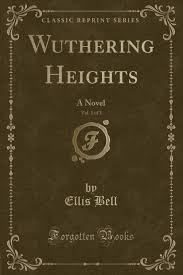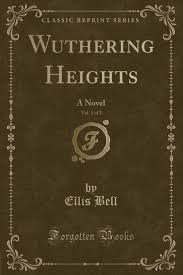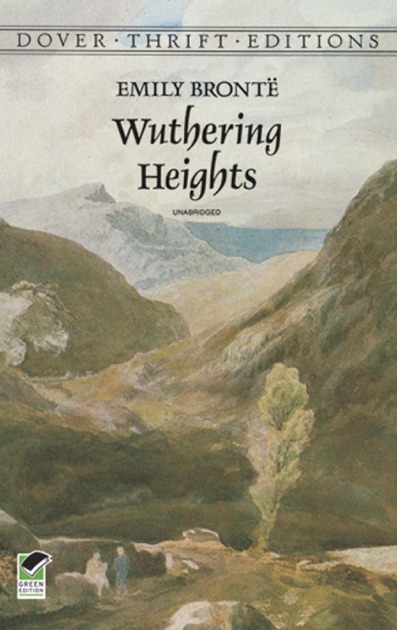Hi again!
Yes, you read that title correctly. “Props to Wuthering Heights?” you ask. “Didn’t you say you didn’t like Emily Bronte’s famous novel?”
I did. You’re right.
And I’m feeling pretty guilty about it, too.

As much as I may not have enjoyed Wuthering Heights my first time around with it, I can’t say that I didn’t enjoy any of it. There were plenty of pieces that I appreciated and that continue to resonate with me still. Because of this, I thought I’d share what I actually LIKED about Bronte’s novel. Maybe you’ll enjoy these quotes too:
- “I wish I were a girl again, half-savage and hardy, and free.”
- I feel like all of us — women and men alike — can relate to the above quote. We wish for the freedom of being children: when the world’s expectations hadn’t quite reached us yet and the pressures of it weren’t applied. As an adult, this freedom isn’t as easy to come by. There are rules now and we have been taught to follow them.
- “If he loved with all the powers of his puny being, he couldn’t love as much in eighty years as I could in a day.”
- Maybe this refers to someone’s passion or, better yet, their passion relating to someone specifically. All people are can be passionate, but one can be capable of more passion when it comes to someone they truly know and understand, rather than someone who only believes they know someone.
- Passion can be misplaced. The issue is, we might not realize it until we find the thing or person that truly ignites that fire within us.
- “He shall never know I love him: and that, not because he’s handsome, but because he’s more myself than I am. Whatever our souls are made out of, his and mine are the same.”
- Perhaps this is what it’s like to find one’s soulmate? Obviously, a soul connection exists on a far deeper level than the surface of our skin and, hence, outter beauty is irrelevant. Maybe this love scared Catherine because it terrified her to be so much like someone who was so terrible? While I’m sure it’s easier to relate to someone who is similar to yourself, I think someone opposite of you could see things in you you’d never recognize in yourself. Maybe your reflections are just that: mirrored images. The same but different. They recognize one another but in opposite ways.
- Does any of that make sense? Like two sides of the same coin. You see the same thing, but from a different perspective. If you were simply the same, you couldn’t understand anything other than what you recognize in yourself. Seeing things differently but having a shared understanding allows things to be seen on a deeper level. Maybe this is where passion comes into play?
- “If all else perished, and he remained, I should still continue to be; and if all else remained, and he were annihilated, the universe would turn to a mighty stranger.”
- I think we can all relate to this. There are things that we can live with and things we cannot live without and, sometimes, those things aren’t the most logical or sensible but, hey, that’s love, isn’t it?
- “Treachery and violence are spears pointed at both ends; they wound those who resort to them worse than their enemies.”
- If people realized this, maybe then the world would be a lot kinder place. As miserable and terrible as you may feel at some point, bringing destruction upon others only wounds you further. They, though having been brought unnecessary hurt, will recover far faster and at a deeper level, than those inflicting harm.
- “Catherine Earnshaw, may you not rest as long as I am living. You said I killed you – haunt me then. The murdered do haunt their murderers. I believe – I know that ghosts have wandered the earth. Be with me always – take any form – drive me mad. Only do not leave me in this abyss, where I cannot find you! Oh, God! It is unutterable! I cannot live without my life! I cannot live without my soul!”
- If murderers are haunted by their victims, then Heathcliffe would rather have murdered Catherine so that she may haunt him. Both of these outcomes might be her death but, at least in one, she will remain with Heathcliffe. I guess we don’t always cope in the healthiest of ways when dealing with love lost.
- “I have dreamt in my life, dreams that have stayed with me ever after, and changed my ideas; they have gone through and through me, like wine through water, and altered the color of my mind. And this is one: I’m going to tell it – but take care not to smile at any part of it.”
- This one resonates with me because, on more than one occasion, I’ve woken from a dream and it’s altered my life. I’ve had dreams of multiple adventures and, once I’ve woken, have had new ideas for novels. These ideas stay with me while asleep and awake, constantly evolving as new ideas come into play. Dreams and reality mix into one.
- Rather than those we find while asleep, there are others that come from the lives we live: from the people we see, the places we visit, the books we read, and the movies we watch. New dreams grow in us every day and, once they’ve been planted, their roots grow deep and their branches grow tall.
- Sometimes, they may embarrass us to admit so, “take care not to smile at any part of it.” Do not mock them for they are much closer to our hearts than we sometimes find difficult to recognize.
- “I gave him my heart, and he took and pinched it to death; and flung it back to me. People feel with their hearts, Ellen, and since he has destroyed mine, I have not power to feel for him.”
- Heartbreak. There’s only so much that we can take before there’s nothing left to give.
- “It was not the thorn bending to the honeysuckles, but the honeysuckles embracing the thorn.”
- While this quote referred to Catherine and a place she’d lived in the novel, I could see it interpreted in another way: rather than the evil seeking to the good, the good seeking the evil. Sometimes, it’s enthralling.
- “I am now quite cured of seeking pleasure in society, be it country or town. A sensible man ought to find sufficient company in himself.”
- Though the world is vast and limitless, there’s nothing more important than being content with yourself first. There are dangers and violence and evil out in the world, make sure your own company can stand on its own and up against what’s outside of it.
- “I’m wearying to escape into that glorious world, and to be always there: not seeing it dimly through tears, and yearning for it through the walls of an aching heart: but really with it, and in it.”
- Whether this be salvation or simply a better place than the one we find ourselves currently, we can’t help but wish to be there rather than where we are. We look to be on the positive side of things, where the grass is greener and the sun shines brighter, those dim memories behind us.
- “I have not broken your heart – you have broken it; and in breaking it, you have broken mine.”
- When those we care about aren’t true to themselves, they often blame others for their lack of self. But, the truth is, they’ve broken their own hearts and, as a result, they’ve broken ours as well.
Like I said, there is a lot to love about Emily Bronte’s book and, though written almost two hundred years ago, there’s a lot to relate to as well.
At least there is for me!
Let me know what you think!
Happy Reading,
-T.


